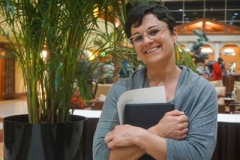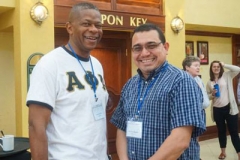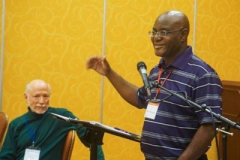Disciple-Making Church Conference participants embrace their flaws through ancient Japanese philosophy of Kintsugi
March 16, 2017
As flameless candles cast faint shadows on the walls, worshipers at the Disciple-Making Church Conference entered the meeting room—transformed into sacred space—on the evening of January 18 prepared to experience a unique service inspired by the Japanese art form of Kintsugi.
Participants in the annual conference had earlier in the day been introduced to the concept of Kintsugi, in which broken pottery is repaired with powdered gold or other precious metals. As a philosophy, it treats breakage and repair as part of the history of the object. “Rather than throw an object away, we embrace its flaws,” explained the Rev. Jeff Eddings, co-founder and pastor of the Hot Metal Bridge Faith Community in Pittsburgh, where the Kintsugi service originated. “Through it, we are reminded that God values the marks of wear that we endure through the course of life. We may be cracked and fractured, but we are filled with the power of God.”
Eddings gave the keynote addresses at the 2017 conference, titled Abide in Me… A Spiritual Purging, designed to introduce participants to Ignatian spiritual principles and practices to help them to live fuller, more integrated mental and spiritual lives.
Observing that most churches and pastors are uncertain as to where to begin with mental health, Eddings said that he started the Kintsugi service at Hot Metal Bridge in the fall of 2015 to more intentionally address the community’s mental health issues, such as anxiety, addiction and depression.
“For too long, the church has neglected the mental health of the members of our community,” he said. “We have not done a good job of integrating our mental health and our spirituality. We must in our ministries find a way to better mental health.”
In the second of his three scheduled keynote presentations, Eddings introduced conferees to the second principle of the Ignatian way of spirituality, Disordered Attachments, which he defined as “the unhealthy connections we have to those things that are destructive to ourselves, others and our relationship with God.”
“What St. Ignatius would call our ‘disordered attachments’ or affections are roadblocks to inner places of peace and wholeness,” said Eddings. “In the church, we would traditionally call this ‘sin,’ from the Hebrew word chata, taken from archery, meaning missing the mark…deliberate choices that we make that are destructive.”
Using 2 Corinthians 4:7-10 as a guiding Scripture—citing “treasure in clay jars” as “a perfect metaphor for who we are, fragile and oh so easily broken”—Eddings said that “today’s message is not so much that we are sinful creatures in need of correction, but [that] we are all broken creatures very much in need of healing.”
“Sin is not necessarily just us making a bad choice—not that we have attached ourselves to something, but something has attached itself to us, our addictions, for example,” he continued. “Some of us by our very nature are predisposed to be more addicted to substances than others, such as in alcoholism, which is hereditary, yet Paul says we have treasure within us.”
At Hot Metal Bridge in Pittsburgh, Kintsugi worship—designed to help promote better mental health—is held on the second Sunday of each month. The order of service, which was recreated for conference participants, is more contemplative in nature, employs a simple chorus “like a Taizé vibe,” and uses guided meditations to enter into the Scripture and candles. The service also includes the sharing of “a mental health story.”
By way of illustration and preparation, Eddings shared his own mental health story during the morning keynote presentation, disclosing his experience of brokenness and healing through a course of therapy and spiritual direction. He followed his story with an original drama, “Get Up!” based on Jesus’ healing of the paralytic in Luke 5:17-26.
Eddings’ s colleague, the Rev. Jenn Frayer-Griggs, table minister and lofts coordinator at Hot Metal Bridge, shared her own mental health story during evening worship. At Hot Metal Bridge, Frayer-Griggs regularly leads a mental health support group immediately following each service. In the spirit of that practice, she, Eddings, and conference music leaders, the Revs. Ayana and Aaron Teter, made themselves available for prayer with worshipers after the evening service.
The day’s schedule included a second optional workshop on spiritual direction, “Contemplative Listening in a Small Group,” again led by the Rev. Bill Cooley, an honorably retired PC(USA) minister and spiritual director in Tampa Bay Presbytery.
As part of Cooley’s workshop—in which he presented the purpose, dynamics and logistics of the group spiritual direction process—Cooley introduced the Rev. Bobby Musengwa, a conference attendee and pastor of Maximo Presbyterian Church in St. Petersburg, Florida.
Musengwa, who has been a member of Cooley’s small spiritual direction group of area pastors for six years, shared his experience of having introduced the group spiritual direction concept to his congregation, firm in the belief that the church’s ruling elders and members would benefit from it. So passionate were church leaders about starting small groups that Maximo Now claims 4-5 active spiritual direction groups at any given time.
With humor, humility and self-awareness, Musengwa confessed to the gathering that it was difficult for him not to
control the process once he had shared it with key church leaders.
“I had come with something that was very definite, but the Spirit of God was birthing something new with the people,” he said. “When I let go, that’s when I started to really enjoy it.”
Emily Enders Odom, mission communication strategist
Today’s Focus: Disciple-Making Church Conference
Let us join in prayer for:
PC(USA) Mission Co-workers:
Elmarie Parker, Lebanon
Scott Parker, Lebanon
Michael Parker, Egypt
PC(USA) Agencies’ Staff
Valerie Way, PMA
Jennifer Whalen, PMA
Let us pray:
God of reconciliation, help us to invite others to the dance floor and to accept whatever invitations come, that we may worship you in spirit and in truth. Amen.
Daily Readings
Morning Psalms 27; 147:12-20
First Reading Jeremiah 4:9-10, 19-28
Second Reading Romans 2:12-24
Gospel Reading John 5:19-29
Evening Psalms 126; 102
![]() You may freely reuse and distribute this article in its entirety for non-commercial purposes in any medium. Please include author attribution, photography credits, and a link to the original article. This work is licensed under a Creative Commons Attribution-NonCommercial-NoDeratives 4.0 International License.
You may freely reuse and distribute this article in its entirety for non-commercial purposes in any medium. Please include author attribution, photography credits, and a link to the original article. This work is licensed under a Creative Commons Attribution-NonCommercial-NoDeratives 4.0 International License.


